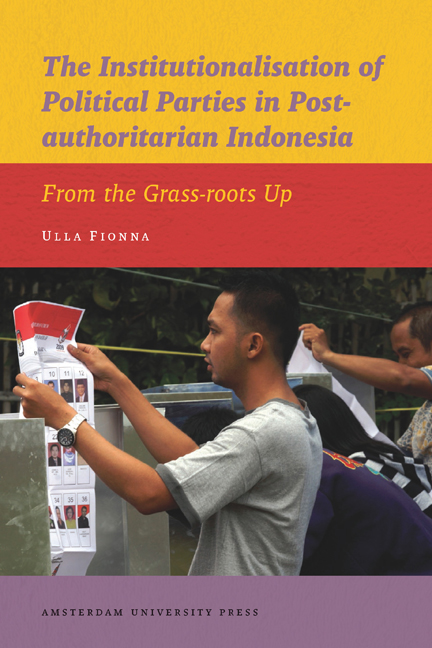 The Institutionalisation of Political Parties in Post-authoritarian Indonesia
The Institutionalisation of Political Parties in Post-authoritarian Indonesia Book contents
- Frontmatter
- Dedication
- Contents
- Preface
- Acknowledgements
- 1 The Question of Institutionalisation
- 2 Genesis of Modern Political Organisation in Indonesia
- 3 Diminishing Grass-roots Influence during the New Order
- 4 Party Organisation
- 5 Party Activities
- 6 Recruitment Approaches
- 7 Members’ Motivations and Participation in the Parties
- 8 Party Career and Intra-party Democracy
- 9 Progress of Party Institutionalisation and Its Role in Indonesia’s Democratisation
- Glossary
- Notes
- Bibliography
- Index
- Miscellaneous Endmatter
1 - The Question of Institutionalisation
Published online by Cambridge University Press: 28 January 2021
- Frontmatter
- Dedication
- Contents
- Preface
- Acknowledgements
- 1 The Question of Institutionalisation
- 2 Genesis of Modern Political Organisation in Indonesia
- 3 Diminishing Grass-roots Influence during the New Order
- 4 Party Organisation
- 5 Party Activities
- 6 Recruitment Approaches
- 7 Members’ Motivations and Participation in the Parties
- 8 Party Career and Intra-party Democracy
- 9 Progress of Party Institutionalisation and Its Role in Indonesia’s Democratisation
- Glossary
- Notes
- Bibliography
- Index
- Miscellaneous Endmatter
Summary
Because of their prominence in Western democracies, political parties have a reputation as the most established means of political participation. Political parties serve as an important vehicle for engagement in politics, and becoming a party member is a simple way to take a political stance. However, in Indonesia, the connection between political parties and political participation was undermined by two of Indonesia's most prominent presidents, Sukarno (1945-1966) and Suharto (1966- 1998). Sukarno is famous for his decision to ‘bury the parties’, while Suharto manipulated the party system to enhance his personal power. Sukarno and Suharto, Indonesia's first two presidents, dramatically shaped the political landscape by controlling political parties and limiting their freedom to develop. Under Sukarno's policy of Guided Democracy, parties were seen as a serious threat to presidential power. Sukarno created a system that allowed him greater control while diminishing party authority. Under Suharto's New Order regime, the links between citizens and government became even more limited, and only a handful of people could participate in formal politics. The architects of the New Order argued that Indonesian citizens were better off not being involved in politics: instead, they should be a ‘floating mass’ that concentrated on economic development. As a result of this policy, Indonesian parties – with the exception of the government-backed political vehicle Golkar – were not allowed to operate at the community level. Their ability to channel political participation and recruit grass-roots members was thus limited.
Since the fall of Suharto, political parties, both old and new, have had the freedom to operate and compete with one another nationally and locally. As this book shows, major parties have used this freedom to develop their organisations. I place particular emphasis here on the operation of their local branches and their management of members as indicators of their organisational capacities. But while Indonesian parties now have the opportunity to influence politics and society, and experiences from other countries show that parties can play a crucial role in democratisation, their role in Indonesia's democratic process is still unclear.
Around 180 political parties were established in Indonesia immediately after Suharto resigned in 1998.
- Type
- Chapter
- Information
- The Institutionalisation of Political Parties in Post-authoritarian IndonesiaFrom the Grass-roots Up, pp. 13 - 24Publisher: Amsterdam University PressPrint publication year: 2013


